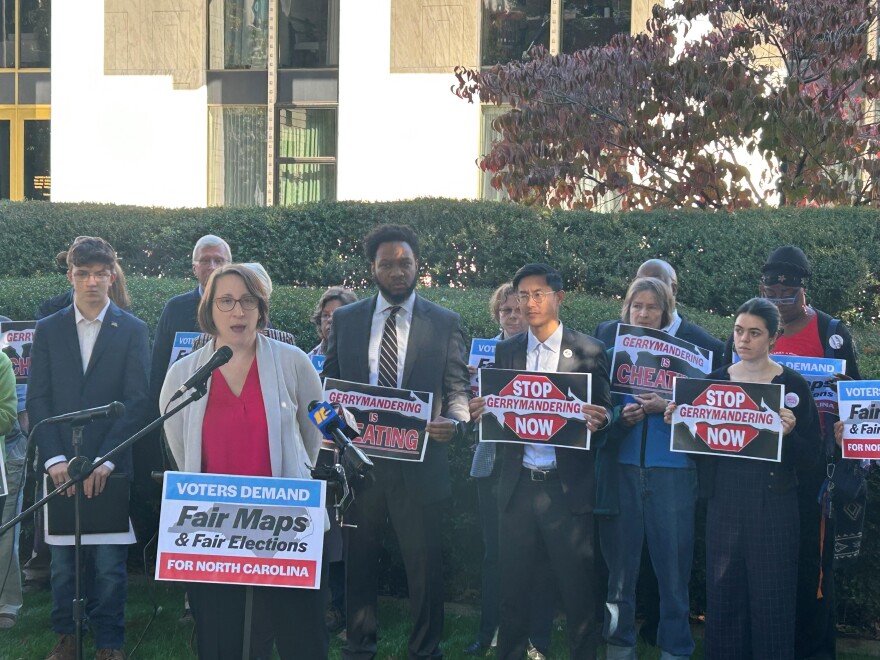North Carolina's Republican-dominated legislature gave final approval Wednesday to new district maps for congressional and state Senate and House races starting next year.
The plans are likely to give Republicans a solid majority in the state's congressional delegation and assure the GOP a strong chance of regaining a veto-proof supermajority at the North Carolina General Assembly.
Critics, including legislative Democrats, say Republicans are locking in partisan advantage with unconstitutional gerrymandering.
"We know that all voters deserve to have their vote count equally and that is not what these maps do, and it is clear that that was not the intent of the legislative leadership," said Ann Webb, policy director for Common Cause North Carolina, a government watchdog group.
Republicans targeted North Carolina's Black Belt, says a voting rights advocate
Webb and other voting rights advocates rallied outside the state legislature on Wednesday, ahead of the final votes on the newly drawn district maps.
Webb accused Republicans of slicing and dicing—or "packing" and "cracking" in gerrymandering parlance—minority communities to dilute their voting power and increase the GOP's hold on political power at the state legislature and in North Carolina's congressional delegation.
She said, for example, that in the state senate district map, Republicans targeted North Carolina's Black Belt in the state's northeastern corner near the Virginia border.
The senate map splits up historically Black communities and lumps some of them into a stretched-out district that runs down North Carolina's coast and connects with a more conservative, whiter area to the south, Webb said.
"The two ends of that district have nothing in common," Webb argued. "They are far from one another; they have different communities, and they should not be gerrymandered into a district together."
Webb added that these gerrymandered districts means Black voters will find it difficult to elect candidates of their choice, something that is protected under the 1965 Voting Rights Act.
GOP likely to win at least 10 Congressional seats in 2024
Catawba College Political Science Professor Michael Bitzer said Republicans seem to have done the same kind of "packing" and "cracking" with their new Congressional map, one that is likely to turn a 7-7 split with Democrats into at least a 10-4 advantage for Republicans.
Bitzer said his analysis shows Republicans packed Democrats into a few districts and cracked up other left-leaning areas, in the cities of High Point and Greensboro, for example, to dilute their vote by attaching them to red-leaning rural areas.
The North Carolina Supreme Court's Democratic majority last year found that Republican lawmakers had gerrymandered maps with unconstitutionally excessive partisanship. The court ordered new maps, which, in the case of the Congressional races, yielded a 7-7 tie between Democrats and Republicans.
But Republican justices won two Supreme Court seats in the midterms and now hold a 5-2 majority. That majority revisited last year's partisan gerrymandering decision and reversed it.
"And said, 'No, this is really a political question that the courts can't determine, it's best left up to the legislature,'" said Bitzer, and added that the reversal gave Republican legislators freer rein to engage in more aggressive gerrymandering this year.
Republicans say GOP will win votes based on their policies
Republicans like Rep. Destin Hall, who chairs the House redistricting committee, maintains GOP lawmakers applied traditional redistricting criteria, like minimizing the splitting of municipalities, to the drawing of new maps.
"What will determine if we have majorities in this body will be the principles that we've passed throughout this decade," Hall recently told reporters.
Republicans passed measures this year restricting abortion and eliminating the need for a permit to purchase a handgun over Democratic Gov. Roy Cooper's vetoes. Under state law, governors cannot veto district maps.
Opponents of the GOP redistricting plans disrupted senate debate this week but the political reality suggests this might be as fair as the maps will get, this time around.







